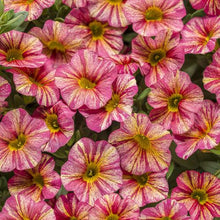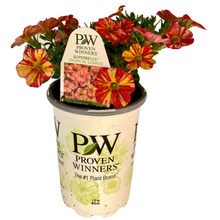DETAILS
Overview
I let my PETALS do the talking.
The petite flowers grace cascading plants that are great in combinations, mono-hanging baskets and in raised beds with great drainage.
Abundant, small petunia-like flowers all season on cascading growth; low maintenance
Woo-hoo! There is nothing more super than Superbells. If there was a word that meant extra, extra super it still wouldn't be as super as we are. Calibrachoas are a new type of plants that sort of look like little Petunias, which makes sense seeing as we're related. Only Superbells aren't sticky, perk right back up after it rains, and stay compact and bushy even when we're stressed. Superbells are Proven Winners' newest Calibrachoas. We're the ones covered with hundreds of flowers from early spring all the way through those first light frosts. Just 6 - 10 inches tall, our long, long, trailing branches cascade over the sides of hanging baskets and other containers, and spread over flower beds. Hummingbirds are cuckoo about us.
Superbells® superb color, heat tolerance, disease resistance and large blooms make this series a great performer. With growth habits that range from small and compact to the cascading, Superbells® create endless possibilities in containers. Superbells® come in many different colors and do best in full sun.
Sun Exposure

Plants that require part sun to part shade need at least 4 hours of sun but can’t take more than 6 hours of sun. These are great for locations that only get the morning sun or only get the afternoon sun or only get the evening sun. They can also be planted in area that filters the sun all day long like under a tree.
Growing Season



Dimensions
Height: 6-12”
Width: 12-24”
Spacing: 8-12”
Qualities
- Deadheading not necessary
- Long Blooming
- Fall Interest
- Heat Tolerant
- Deadheading Not Necessary
- Container Spiller
- Trailing
Maintenance Notes
When planting Calibrachoa I often give the plants a slight trim, using a sharp pair of scissors or pruning shears. While not a necessary step, it will increase branching and may help your plants look even fuller.
Calibrachoa are usually easiest to grow in containers because if the roots are kept too wet can lead to root rot diseases. In containers, allow the top of the soil to dry before watering again. If your plant is wilting even though the soil is still damp you likely have a root rot problem. Calibrachoa can be fantastic in-ground plants, but only if they are planted in well drained soil. Raised beds would be a good choice for planting Calibrachoa in the landscape. In the ground they shouldn't need much additional water unless conditions are very dry. Proper watering is key to growing good Calibrachoa.
The plants are low-maintenance with no deadheading needed. They will do best if fertilized in a regular basis.
As the season goes on the plants can sometimes just start to look open and not as good. This can happen even if they are being watered and fertilized correctly. Fortunately this is very simple to fix. Grab a sharp pair of scissors or pruning shears and give the plants an all over trim. This will cause them to branch out more and should stimulate new growth and flowering, especially if you fertilize right after trimming them back. Just like your hair looks a lot better after a trim, your plants often will too. You will sacrifice flowers for a few days, but the plants should come back flowering more than ever shortly. I will usually give my Superbells a trim back in late July or early August. Should your plants have a few unruly stems that are longer than everything else or sticking our oddly, you can trim these stems back at anytime. Calibrachoa are very forgiving when it comes to trimming.




